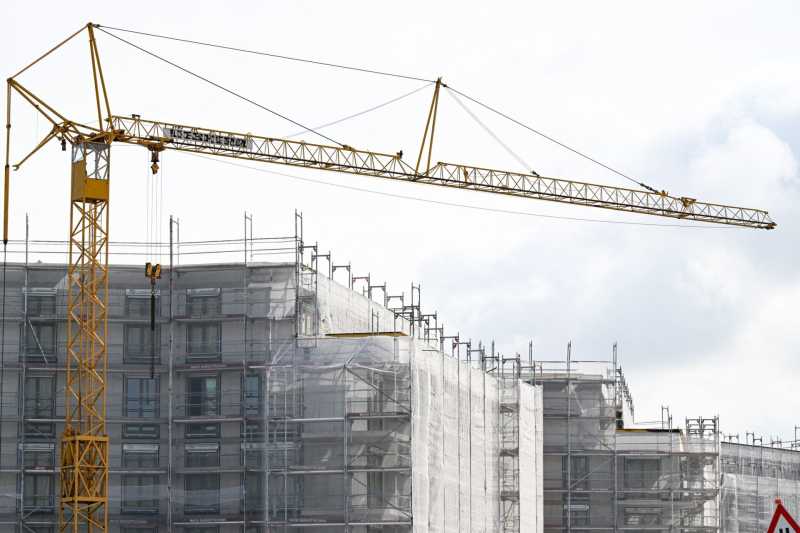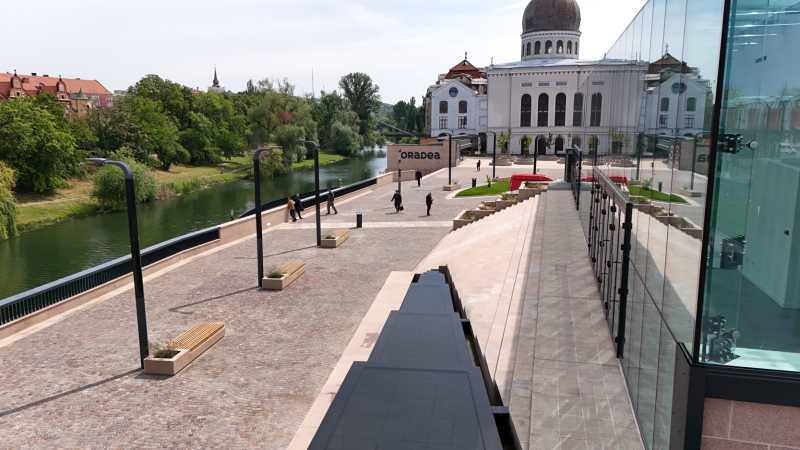Housing crisis rising up EU political agenda as fast as property costs (enr)

Brussels, March 12 /Agerpres/ - Housing, or rather the lack of it, is a big problem across the European Union. What are bloc's governments doing about it? And how is the European Commission involved?
'Almost 900,000 people are currently homeless in Europe. Every night in Europe, a population comparable to that of Marseille or Turin, is without a home,' European Commissioner for Energy and Housing Dan Jorgensen said at the first meeting of the Special Committee on the Housing Crisis in the European Parliament.
Nearly 10 percent of the European Union population spent 40 percent or more of their disposable income on housing and related costs, according to Jorgensen.
According to the Commissioner, over the past 15 years or so, rents in the EU have increased by around a quarter in real terms, and house prices have increased by around half.
The Danish Commissioner was laying out his plans to help the EU tackle one of the biggest problems facing the bloc's member states - the housing crisis which has risen rapidly up the political agenda, almost as fast as rents and house prices are going through the roof.
European Commission President Ursula von der Leyen appointed the former Danish energy minister to be the first commissioner for housing - an area where the EU has little direct power - to secure the support of the Socialists in the European Parliament for her re-election.
Acknowledging this fact, Jorgensen stressed to the parliament that 'most of the responsibility' for housing lies with EU countries and regional and local authorities, but made his case that there is 'room for Europe at the table and there [are] a lot of things that we can and should do'.
Jorgensen said that the Commission will publish its first-ever European Affordable Housing Plan. The plan will offer technical assistance to cities and EU member states and focus on investment and skills needed.
In particular, the Commission will develop a European Strategy for Housing Construction to:
support housing supply,
establish a pan-European investment platform for affordable and sustainable housing,
conduct an analysis of the impact of housing speculation,
support EU Member States to double the planned cohesion policy investments in affordable housing,
tackle systemic issues with short-term accommodation rentals,
make proposals to tackle the inefficient use of vacant housing stock,
and revise state-aid rules to enable housing support measures, notably for energy efficiency and social housing.
Housing cannot wait
In his speech, the Commissioner touched on the EU's direct lack of competence in housing policy. However, local governments in European cities are pushing for more action at an EU level.
The mayors of twelve EU cities, from Rome, Bologna, Amsterdam, Athens, Barcelona, Budapest, Paris, Warsaw, Lisbon, Lyon, Ghent and Leipzig, have teamed up to call for an emergency plan by 2027 at the latest to tackle the housing crisis. The mayors want finances for housing to be exempt from EU fiscal rules limiting government expenditure. They also want unspent money from Covd-19 relief funding to be redistributed.
In addition, the mayors met with Jorgensen in Brussels to press him for assistance, underlining that the problem cannot wait for the next EU budget to be finalised before action can be taken.
The twelve mayors will also work in the coming months on a housing action plan for the Commission. Matteo Lepore, mayor of Bologna, highlighted especially that in Italy, between 10 and 15 percent of private houses are unoccupied.
Make yourself at home... if you can
In the Commissioner's homeland, Denmark, both rents and house prices are rising.
The price of owner-occupied housing rose in 2024 and is expected to rise further in 2025.
One of the major Danish banks, Nykredit, expects average house prices across Denmark to rise by 4.4 percent this year. For the Copenhagen apartment market, prices are forecast to rise by 6.2 percent this year.
One way Denmark wants to fix the housing stock, especially the lack of housing with affordable rent, is to convert temporary student housing into affordable and permanent public housing.
In Ireland, house prices rose last year at nearly twice the rate of 2023, as the number of homes available in the Republic dropped to a historic low in January 2025. The Central Statistics Office (CSO) revealed that house prices in December were 8.7 percent higher compared to the previous year in its latest residential property price index. This indicates that the annual rate of house price inflation nearly doubled in 2024, compared to the 4.4 percent increase seen in 2023.
Ireland's rental market is severely undersupplied and grossly overpriced, as the latest data from property website daft.ie shows. Average monthly rents in Dublin range from 2,294 to 2,704 Euro in the third quarter of 2024, depending on location. The national average stood at 1,955 Euro.
Austria, well-regarded in EU policy organisations for the supply and quality of social housing in Vienna, is not immune to the issue. The new Austrian government plans a gradual capping of rents for the regulated market over the next three years. From 2028, rent increases in the 'entire residential sector' will be limited to a maximum of 3 percent, according to the government programme.
A researcher from the Austrian Institute of Economic Research, Michael Klien, said the market impact of the government policies to intervene in support of affordable housing would be manageable.
However, 'you have to be a bit careful,' warned the expert. 'Some of the rent adjustments don't happen within a housing contract, but as many contracts are also limited in time, the increases are often applied to the new contract,' explained Klien. 'This is not covered by the regulation.'
Klien does not foresee any immediate price increases in private sector housing over the next three years to compensate for the impending cap. 'The rents currently being demanded on the market are already stretching the willingness to pay,' the economist said.
Spain is also taking drastic action to address rising house prices and rents. Spanish Prime Minister Pedro Sanchez proposed in January to ban people outside the EU from buying housing in the country, as part of his drive to ease an affordable-homes crisis.
The plan followed a previous proposal from the Socialist leader to slap a tax of up to 100 percent on such property deals in a country struggling with strong demand and soaring prices. According to real estate registry data, British people led the way for foreign property buyers in 2023 with 9.5 percent of the total transactions by non-Spaniards.
Rents in Madrid have risen by 82 percent in the past decade, according to the property listings website Idealista, mirroring increases in other major Spanish cities. And social housing is very scarce. Madrid, a city of around 3.4 million people, has just 9,200 low-rent social housing units, one of the lowest figures in the EU.
The Spanish capital has resorted to a lottery to assign social housing flats. Every quarter, Madrid puts 50 to 200 social housing flats up for grabs that are open to people who meet income and residency criteria. But this lottery meets just 1 percent of demand.
Airbnb: live like a local, except there's no locals
Only 90,000 new units are built in Spain every year while 120,000 new households are created, according to Idealista figures, leading to a housing shortage that has caused rents to soar.
A boom in holiday lets on platforms such as Airbnb has also worsened the housing shortage in Spain, sparking large protests across the country and pushing housing to the top of the political agenda.
In Slovenia, rentals for tourism are also a factor in the housing crisis, which has become one of the key problems in recent years, especially among young people. The situation is particularly critical in Ljubljana and major urban centres.
In Croatia, the inability to buy a first home at an affordable price is one of the main reasons for large numbers of young people emigrating. One of the main problems is that many apartments on the Croatian Adriatic coast, and in the capital Zagreb, are intended for short-term tourist rentals. It has become impossible to find an apartment for long-term rental or for purchase at an affordable price.
Nearby, Bulgaria recorded one of the highest house price increases in the EU between 2010 and 2024. According to Eurostat, prices in the country have more than doubled (+110 percent) in this period.
The content of this article is based on reporting by AFP, ANSA, APA, BTA, HINA, Ritzau, STA, as part of the European Newsroom (enr) project. AGERPRES (editing by: Mariana Ionescu)
The content of the www.agerpres.ro website has the exclusive purpose of public informing.
All the information published on this website by AGERPRES is protected by relevant legal dispositions.
It is forbidden to copy, reproduce, recompile, decompile, distribute, publish, display, modify, create derived components or products or full services, as well as any exploitation of the site's content.
Details in the section Terms of Use. If you are interested in picking up AGERPRES news items, please contact the Marketing Department – [email protected].
The use of the Comments section entails your obligation to respect the AGERPRES terms and conditions in regards to the publishing of comments on the www.agerpres.ro.
Other news in category
Mintia combined-cycle power plant set to start production towards year-end (minister)
Energy Minister Sebastian Burduja said on Thursday in Mintia - Hunedoara County that the project for the new local combined-cycle power plant developed by Mass is at more than 75% of completion for the first cycle and that the first amounts of electricity could be produced here towards the end of the year. 'There are high chances that, at the end of this y
Over 70 historical Dacia cars from all over the country to meet in center of Deva on June 14
Over 70 Dacia cars, restored by car enthusiasts from all over the country, will be on display on Saturday, June 14, in the center of Deva, during the 'National Dacia Classic Meeting', an event organized by Retromobil Club Romania. 'Over 70 Dacia cars, carefully restored by enthusiasts from all over the country, are expected at this edition. The sta
President Dan: We stand with all those affected by the plane crash in India
Romania's President Nicusor Dan on Thursday sent a message of condolence after a tragic plane crash at an airport in the Indian state of Gujarat. 'I am deeply saddened by the tragic plane crash in India, where so many people lost their lives and so many families and friends lost loved ones. On behalf of the Romanian people, I extend my heartfelt condol
Reducing deficits, stabilising public debt remain central to Fitch assessment of Romania's sovereign rating
Prospects for reducing record-high deficits and stabilising rapidly rising public debt remain central to our Fitch Ratings assessment of Romania's sovereign rating following last month's presidential elections, according to Fitch reporting released on Thursday. After years of fiscal slippage and eroded fiscal policy credibility, the next government wil
Romania's national cybersecurity team aiming to become Cyber Hub
Romania's National Cybersecurity and Incident Response Team (DNSC), reorganised under this name in 2021, is aiming to become a Cyber Hub, a recognised leader in cybersecurity, Mihai Constantinescu, cybersecurity manager at the Innovation, Research and Development, Services and Intellectual Property Directorate (INOV) with the DNSC, said on Thursday at a specialist event.
Oradea set to become pilot-city in implementing climate adaptation solutions to combat urban heat waves
The municipality of Oradea plans to implement, for the first time in Romania, in the next five years, a series of local climate adaptation solutions to combat urban heat waves, through a project financed by the European Commission. According to a press release of the Oradea City Hall, the 'Life Cool Zone' project is initiated by the Hungarian authoriti
Tech event Bucharest Tech Week kicks off on June 14 at Romexpo Exhibition Centre
Bucharest Tech Week, the largest technology and innovation festival in Central and Eastern Europe, will be held in Bucharest between June 14 and 20, 2025, with the most relevant trends, solutions and industry leaders to be presented to visitors. The event brings together companies, professionals and technology enthusiasts in a broad framework of networking, de
Ukraine - South-Eastern Europe Summit/ Nicusor Dan: We must be firm in denouncing Russia's actions
AGERPRES special correspondent Cristian Lupascu reports: President Nicusor Dan called for firmness, on Wednesday, at the Ukraine - South-Eastern Europe Summit, in denouncing Russia's actions, which are using 'strategies to delay and sabotage the peace process'. He pointed out that 'the only language that Russia understands is force' and tha
Romanian Embassy in U.S.: 47 Romanians held in Immigration and Customs Enforcement custody
The Romanian Embassy in the United States announced on Wednesday that 47 Romanian nationals whose deportation formalities have been completed are being held in custody in U.S. Immigration and Customs Enforcement centers and that their transportation to the Guantanamo naval base is not being considered. Romania cooperates closely with all American agencies for
Bred, sold, mistreated and abandoned:Can new EU rules on animal welfare make a positive difference? (enr)
Everybody proclaims to love their fur babies. But are really enough rules in place to make sure that Spot and Puss are being treated well by their breeders, sellers and owners? The European Parliament has taken a further step in that direction. Demand for furry companions such as cats and dogs has been rising across the European Union, with th
Predoiu: 1848 revolutionaries left legacy of honour - Romania is built through values, sacrifice and solidarity
The Revolution of 1848 marked the emergence of a generation of visionaries and fighters who, through courage and ideals, laid the foundation for modern Romania, said interim Prime Minister Catalin Predoiu on Wednesday, on the occasion of the Victory Day of the 1848 Revolution and Romanian Democracy. 'On June 11, we celebrate the Victory Day of the 1848 Rev
Romanian Smart City Association concludes strategic partnership with Fira Barcelona
The Romanian Smart City Association (ARSC) has signed a strategic partnership with Fira Barcelona, the organizer of the Smart City Expo World Congress (SCEWC) and Tomorrow Mobility World Congress (TMWC), the most important international platforms dedicated to urban transformation, sustainable mobility and innovation for smart cities, according to a press release sent to AGER
Romanian Red Cross: Over 1,900 people trained to offer psychological first aid in crisis situations
The Romanian Red Cross on Wednesday informed the development of a national network of over 1,900 people trained to provide immediate psychological support in emergencies - from natural disasters to forced migrations and armed conflicts. According to a press release sent to AGERPRES on Wednesday, this capacity, which was built over the past three years, include
Football: Romania defeats Cyprus 2-0 in 2026 World Cup qualifiers
Romania's national football team defeated Cyprus 2-0 (2-0) on Tuesday evening at the National Arena in Bucharest, in Group H of the 2026 FIFA World Cup qualifiers. The Tricolours won through goals scored by Florin Tanase (43') and Dennis Man (45+2'). Romania did not make an impressive match, but still won without any problem, remaini
Sublocotenent Ion Ghiculescu minehunter departs for new MCM BLACK SEA TG exercise
Sandown-class (M270) minehunter Sublocotenent Ion Ghiculescu departed on Tuesday from the Constanta military port to participate in the fifth mission of the Black Sea Mine Countermeasure Task Group, alongside two ships of the Bulgarian Naval Forces and one vessel of the Turkish Navy. The Navy General Staff informs that minehunter Sublocotenent Ion Ghiculescu,
















